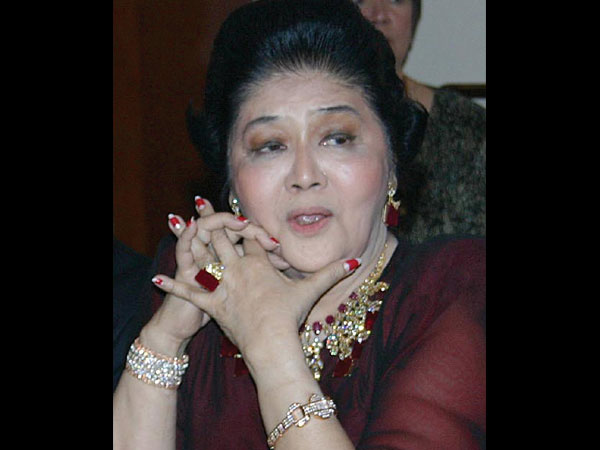US officials seize Marcos properties worth P1B
US authorities have seized a fresh cache of dollars, prime New York properties and paintings worth as much as P1 billion believed to be part of the hidden wealth plundered by Ferdinand Marcos during his two-decade rule, the Philippine Daily Inquirer learned Tuesday.
The revelation was made on the day the Reuters news agency, in a dispatch from New York City, said that Vilma Bautista, a New York resident and one-time secretary to former First Lady Imelda Marcos, would be charged by the Manhattan District Attorney in connection with four paintings in her possession, including some by Impressionist artists, that disappeared after the fall of the Marcos dictatorship in 1986.
A top government official, who requested anonymity because US federal officials had not authorized the release of this information, told the Inquirer in Manila that the discovery of these assets could lead to more wealth that Marcos, his family and associates had allegedly illegally stashed overseas after the dictator was ousted in the Edsa People Power Revolution in 1986.
“We were informed by US authorities that they have seized several bank accounts after investigating these deposits for unusual large transactions in the past few months. The investigation has led them to seize an apartment in a prime New York location, where more assets and certificates were discovered,” the official said.
The source said that among the assets seized were three paintings of “Old Masters,” including a piece by French Impressionist Claude Monet.
Article continues after this advertisement“We estimate the seized assets to be worth between $20 million and $30 million, or roughly P1 billion,” the source said.
Article continues after this advertisementThe source said that this haul of Marcos assets was not among the fabulous fortune that the government had identified.
Officials of the Presidential Commission on Good Government (PCGG), formed after the 1986 revolution to go after the Marcoses’ ill-gotten wealth, did not return the Inquirer’s calls.
In a report attributed to a person familiar with the investigation conducted by US authorities, Reuters said that some of the paintings in Bautista’s possession hung in a Manhattan town house used by Imelda Marcos when her husband was in power.
The US probe comes a quarter century after the Philippine dictator was forced out by an uprising and fled the country in 1986. He died in 1989.
Bautista, who is in her 70s, could not immediately be reached for comment. Joan Vollero, a spokesperson for Manhattan District Attorney Cyrus Vance Jr., declined comment, according to Reuters.
Imelda Marcos, 83, known for her extravagant lifestyle and her collection of over a thousand shoes, is not expected to face charges in the case, the news agency said.
Acquitted in earlier US case
In October 1988, the Marcoses were indicted in the Federal District Court in Manhattan in a racketeering case that included accusations they embezzled more than $100 million from the Philippine government and used the money to buy three buildings in New York City.
Imelda, described as a “steel butterfly” in her glory days, herself testified before the federal grand jury and was later acquitted.
In a magazine interview published in February 2007, the former first lady, who is now an Ilocos Norte representative in Congress, was asked about her New York trial and her paintings.
“You’re living now in the Pacific Plaza, in Manila. They sold off most of your old masters at Christie’s years ago, but I understand there are a few Picassos and Gauguins still hanging with you in that swanky condo,” the interviewer said.
Imelda replied:
“The paintings and the jewelry they confiscated, all without any good reason. You know, I won the case of the century in New York, and so the little I have left, I will tell you, was because of some servants of mine, who were able to keep a few pieces in the slum area where they were living.”
P90B worth of assets
The PCGG has reported it had recovered over P90 billion worth of assets from the Marcoses and their cronies, including Swiss bank accounts turned over to the Philippine government. A large part of the assets were used to fund the government’s agrarian reform program.
A case study by the World Bank-UN Office on Drugs and Crime’s Stolen Asset Recovery Initiative estimated that Marcos had purloined between $5 billion and $10 billion during his reign from 1965 to 1986.
The study said:
“This ill-gotten wealth was accumulated through six channels: Outright takeover of large private enterprises; creation of state-owned monopolies in vital sectors of the economy; awarding government loans to private individuals acting as fronts for Marcos or his cronies; direct raiding of the public treasury and government financial institutions; kickbacks and commissions from firms working in the Philippines, and skimming off foreign aid and other forms of international assistance. The proceeds were laundered through the use of shell corporations, which invested the funds in real estate inside the United States, or by depositing the funds in various domestic and offshore banks under pseudonyms, in numbered accounts or accounts with code names.” With reports from Inquirer Research
